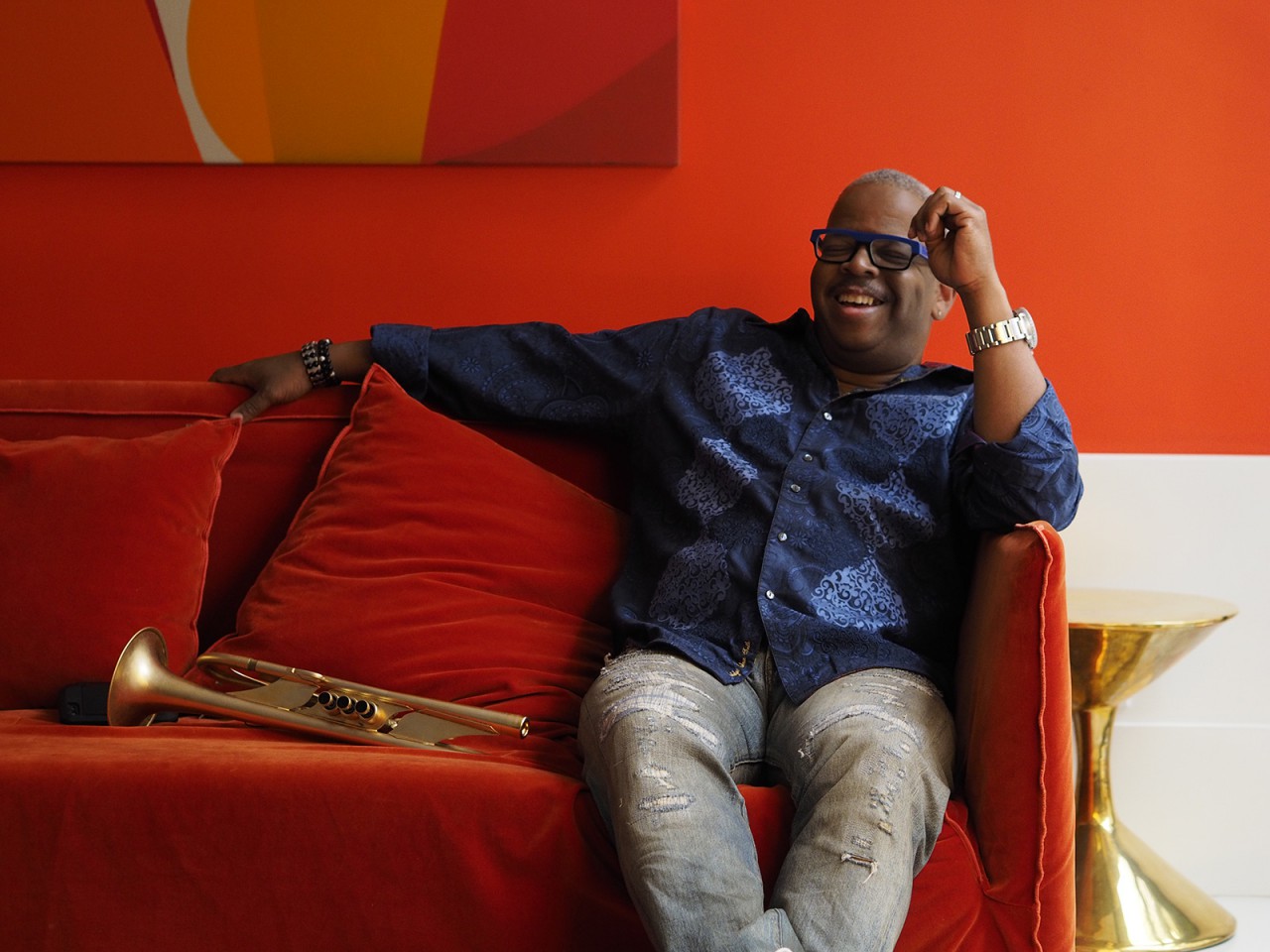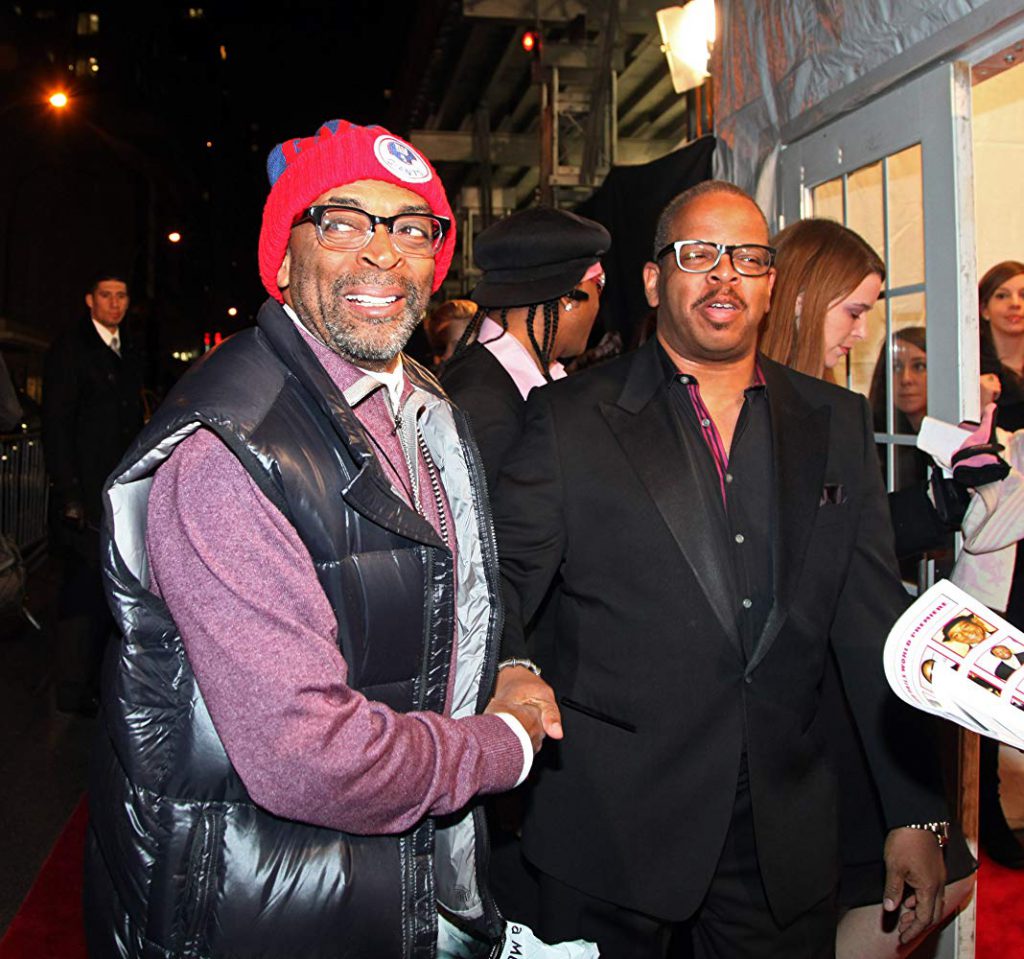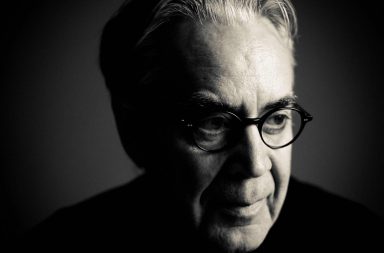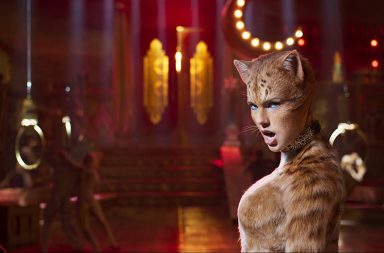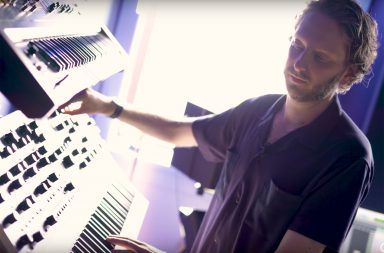It was 5 in the afternoon and everybody in Paris seemed to enjoy the lovely weather so much that you could almost forget that a few hours before, only a mile away from where I was standing, the French Prime minister Edouard Philippe, the mayor of Paris Anne Hidalgo and the mayor of London Sadiq Khan were leading commemorations for the third anniversary of the 2015 Paris attacks. And on the evening of that 13th of November, 2018, trumpeter Terence Blanchard gave a concert to promote his new album, Live. With this new release, the jazz artist used his own form of expression to deal with issues frequently raised by his friend of 30 years and colleague Spike Lee: racism, violence and hate. What a coincidence.
Steeped in history, the New Morning, the ultimate jazz club in Paris, is where we met Terence Blanchard. In April 1981, Art Blakey & the Jazz Messengers – a band that Blanchard himself would join the following year as a trumpeter and in which he would play until the band’s dissolution following Blakey’s death, in 1990 – played on the venue’s opening night. Since then, the New Morning welcomed none less than Lionel Hampton, Stan Getz, Dizzy Gillespie, Chet Baker, Gil Scott-Heron, Nina Simone, B. B. King… Even a Purple Rain-era Prince showed up for a surprise concert, a night of the mid-1980s. The New Morning is a place of a thousand anecdotes and Blanchard can attest to that. One night of 1981, while Gillespie was on the stage, Terence Blanchard and German pianist Joachim Kühn, who both attended the show as simple spectators, joined Dizzy for an impromptu jam session in front of an enthusiastic audience. Think about it.
Film music aficionados essentially know Terence Blanchard for his 15+ scores he wrote for Spike Lee’s films, from Jungle Fever (1991) to this year’s BlacKkKlansman, including Malcolm X (1993) and 25th Hour (2002), for which Blanchard got a Golden Globe nomination, just to name a few. We sat down for an hour with the composer, who talked with passion about his film scores and his relationship with Spike Lee, willingly holding forth on other topics such as politics, the importance of playing live and Hurricane Katrina, his deep, calm voice never holding back a few laughs and always bringing indefatigable inspiration.
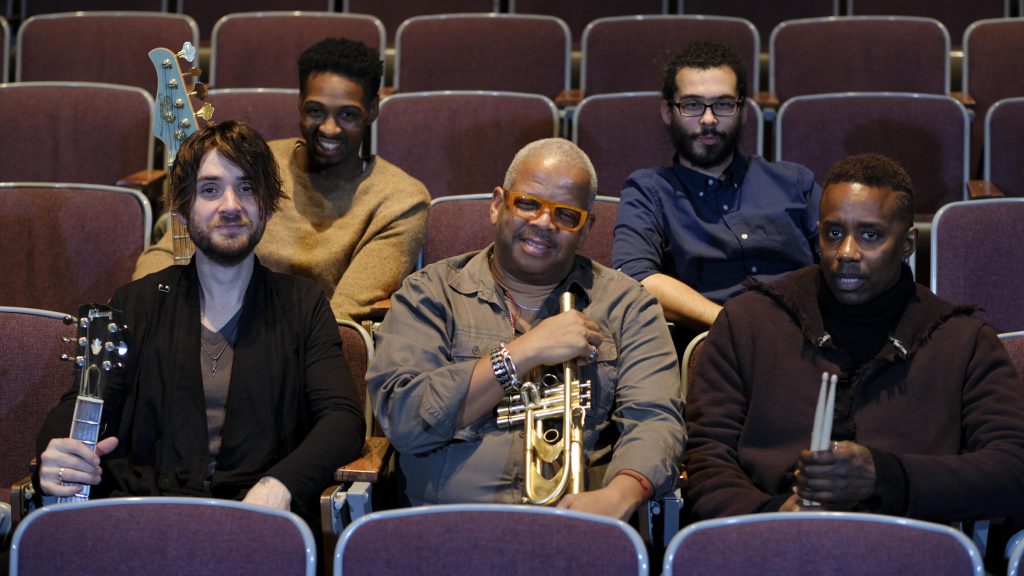
Terence Blanchard with the E-Collective. From left to right: Charles Altura (guitar), David Ginyard (bass), Terence Blanchard, Fabian Almazan (piano) and Oscar Seaton (drums). Credit: Henry Adebonojo. All rights reserved.
Score It Magazine: Firstly, how did you got involved with film music?
Terence Blanchard: Oh, just with Spike. You know, I was a session player on Spike’s early films. I played the piano, he liked what I was playing and asked if he could use it, that’s how it all started. I had no intentions to become a film composer at all. I come from a family of musicians: my father was an opera singer, my mother assisted, played piano and taught voice, my grandfather played the guitar. What I just wanted was to be a jazz musician, have a band, travel and create music.
You never underscore what’s happening on the screen when you compose. Your music and Spike’s story go along on two parallel lines, with a different language. What are you talking about when he comes to you with a new project?
We don’t need to have those discussions anymore because he’s just going, “Hey man, I’m writing this shit, I’m gonna send you the script.” And then, we might have a discussion about what we haven’t done yet. For BlacKkKlansman, he said, “I think I want a R’n’B band to be part of the score” and I just said, “Cool!” (He laughs.) I have an electric band, perfect timing! But we don’t have those deep conversations anymore because I know what Spike likes, and what he doesn’t like is underscore. I try to slip it in, you know, in subtle ways, but that’s really not what he wants. He likes narrative stuff. Melodic, thematic material.
The way Spike uses music in his films is mostly for emotional content, not for storyline support. It’s to pull at your heartstrings. Here’s a guy who is really good at developing the style that is uniquely his own. I think that’s why people are so receptive to BlacKkKlansman, because there’s a lot of things going on with this film. First of all, it’s a really good movie! (He laughs.) If that weren’t the case, none of this other stuff I’m about to say would work. But I think our experience working together as a team has culminated to this moment, and I also think that the audience has become so accustomed to Spike’s films and style… It’s like Woody Allen, see? You know exactly what to expect. I’m happy for him. You know, he’s well deserving, man. One of the things about Spike that I’ve always admired is that he’s a guy with a vision, and he knows what he wants to say in his films and how to say it, and you gotta give him credit for being vigilant and not succumbing to commercial pressure.
I’ve always admired that. He’s willing to take his vision wherever he wants to take it and at any cost.
Listen, man. Making a movie with Spike is like… You know what it is. I’m trying to find a deeper way to say it but no, that’s basically that. You know what it is. The thing that’s amazing about him is that he can work with any DP, what is on the screen is always perfectly composed. And another amazing thing that he does… I don’t know if he did it in BlacKkKlansman, but in Summer of Sam, there’s this one scene where David Berkowitz is eyeing this woman. He’s in the neighbourhood, he sees her, she sees him and then she runs, and there’s footage of a baseball game covering what’s happening in the neighbourhood, you know, “Swing and a miss!” That’s so clever, man.
Talking about BlacKkKlansman, what struck me is how different it sounds, from the point of view of music, than most of Spike’s previous films. Was your composing process any different?
No, basically what it is is the thematic material is different. I’m using an electric band, you know what I mean. But there’s not much difference in how I approach score for any of his films. One of the things that was tough – well, it wasn’t tough, it was rather something I was concerned with – is how I could support this Ron Stallworth character. To me, he’s an amazing hero. You forget that this is a real story. When Spike first told me about it, I didn’t know it, so I listen to the story and I’m like, “Man, this is some crazy shit!” Someone was REALLY being creative, you know! (He laughs.)
And a couple of years after that you’re even wearing a hat of it.
I know, yeah. Look, it was the last one I had! I just grabbed it when I walked out of the house. When I arrived at the airport, I looked at it and I said, “Oh shit!” (He laughs.) But yeah, I wanted the music to have a certain type of strength but also to be – I don’t wanna say melancholic, that’s not the word – heartfelt.
That’s the curiosity of it, because the story itself is not appealing to your emotions and the music is less focused on characters than what he are used to see and year from your collaboration. How did you manage to put emotions in there?
You see, for me, being 56, having grown up in the 70s, I remember that period. We all were screaming, you know, we’re Americans too. Our people died in the war just like yours, we pay taxes just like you. That’s why there’s the electric guitar: when Jimi Hendrix played the national anthem, in Woodstock, that, to me, was the epitome of patriotism. He didn’t have to do that shit, you know what I mean? But he said, “Hey, I’m an American too,” and he screamed it. That’s why I wanted to use (guitarist) Charles (Editor’s note: Altura, a member of Blanchard’s band, the E-Collective) on the score. That’s what a lot of people felt, back then. So maybe my age and having experience that period in our history myself, maybe that’s what I tapped into. And you gotta remember, man, I live in New Orleans, so David Duke (Knights of the Ku Klux Klan founder, played by Topher Grace in Spike Lee’s film) is right in my backyard. The whole time I was working on this film, I thought it was so frustrating, so maddening, to tell people, “You’re not different and they don’t care.” You get an education, you become successful, you do all the things that people say you should do to become a productive citizen and still, people look at you as being something other. That’s a rough situation, so that’s why the melody is the way that it is, because I just look at it as being sad but at the same time, Ron Stallworth is a very heroic dude.
Let’s talk about your latest album, Live, which was recorded in Minneapolis, Dallas and Cleveland, three cities made infamous because of gun violence. How did you come up with this idea?
My first album with this band was called Breathless (released in 2015), and we wanted to continue the debate with Live, which we originally wanted to call Caravan, which is quite ironic now. So the thing was, we didn’t want to just record, but to have some engagement. In Cleveland, we worked with some kids. In Dallas, we had some panel discussions, we invited lawmakers who didn’t show up, but we invited artists and educators, we had a big press conference and talked about some of the issues… We did sort of the same thing in Minneapolis and we also went to this nonprofit organisation that helps, at risk, young men, and they have a huge success rate of rehabilitating people and putting them back in the community. We just wanted to have a discussion about it, because it’s so crazy right now the way the political structures are operating in the US. It’s been that way for ever, we know that, but we’re now at a tipping point where it’s so controlled by money, NRA and all of these things, that they do ludicrous things and say crazy stuff. What we were trying to say with this record is just, “Let’s be sensible.” Nobody’s trying to take anyone’s guns, but everybody shouldn’t have a gun. That shit’s real. Everybody can drive, you know what I mean? Anyway, that’s how this idea came about.
Three years ago today, France went through the deadliest attack of its history, and that happened just a few subway stops from where we are standing now.
We came here right after. In another part of France, though, but there was worry about whether we should come. They said, “Please come, we need music right now.” I forgot what city it was but it was so bizarre, dude. (The concert took place in Nice on November 19th. Eight months after that, on Bastille Day, Nice would undergo another terrorist attack that would kill nearly 90 people and injure another 450.) We had armed guards at our concert and that pisses me off, you know what I mean?
I get it, it’s what French people have been living with for the majority of these last three years. And the irony of that is that the terrorists attacked at a concert venue, which is basically a place for freedom. Do you think that playing live has become an act of resistance more than just a show?
Of course! Playing live, isn’t that what music has always been about? It’s a way to get people to gather and come together, to share experiences and become motivated. It’s a way to help educate, you know. When you look back to Max Roach, the Freedom Now Jazz Suite, all the stuff Charlie Mingus did… You know what I’m sayin’? Especially now, I think it’s particularly an act of resistance because it means people are getting out. They’re going out, living their lives and they’re enjoying music.
Playing live is literally speaking out.
Yeah! You know, I don’t live here and it scares the shit out of me… When I saw the footage of the stage, I thought, “Wait a minute dude, it looks like any other place I could have played in my career.” I guess that’s a jarring thing but, at the same time, one of the things I’ve been saying is, love will overtake hate every goddamn time. And that’s what we have to remember because hate will get us to be afraid and shut in. But the big thing is, that it’s the reason why I’m here! I’ve been coming here since 1982. Why? Because music is a universal thing, it brings people together and they find commonality in their communities through music. I feel that’s where we find our strength, as a community. I’ve been playing this stage here since 1982. And whenever I play it, man, it’s a moment in time. Even if I’m not playing! If I’m here checking out another band, it’s a moment in time and we share this experience with a bunch of people from different walks of life. That’s active resistance. We don’t all have to be the same. We don’t all have to agree. We don’t, but what we can is respect each other, love each other and have these shared experiences. I mean, I find it fascinating that I have conservatives come to my concerts, but they do! (He laughs.) When my opera (Champion, based on the life of boxer Emile Griffith) premiered at the Kennedy Center, I went onstage for my curtain call, I looked down and I saw (conservative leader) Newt Gingrich, and I was like, “Oh… Okay.” (He laughs.) So, music is an act of defiance, literally. Man, it’s not that we’re different, we’re supposed to be different. I guess that was the idea when God created this thing called Earth, you know, we don’t all look alike, we don’t all sound alike, but I kind of look at it as a beautiful thing like, “Damn! Show me yours! How do you do that again?” (He laughs.) I kinda look at that with fascination, and remember, whenever you deal with people who have opposing views, they’re scared! They’re scared of the future, they’re scared of change. They want things to stay the same so they can be comfortable.
But isn’t that the part that music is supposed to play in our lives? To soften something that’s inside of each of us, even those who have radical views because they are scared?
Art Blakey always used to say, “Music washes away the dust of daily life.” But you also have to grow, because if I were playing the same music that I played when I first came here, I wouldn’t have a career. Because things keep moving forward, because most of the people that are coming in tonight probably don’t even remember what was going on when I did that, some of them weren’t even born. So, while the music stands the test of time, artists have to be involved with the vibration that’s going on in the community at a given time. We happen to be doing music through this band, but it didn’t have to be this band, it could be a jazz band, it could be whatever, but the idea is to constantly move forward. My trumpeter used to tell me, “You’re never standing still, ‘cause while you think you’re standing still, you’re actually moving backwards ‘cause the world is moving forward.”
Give me ten minutes and a glass of whisky, I’ll try to think about that.
(He laughs.) Yeah, but it kinda makes sense, right? You have to move forward along with the world.
A few weeks ago, I discovered for the first time the two Spike Lee documentaries about Hurricane Katrina, When the Levees Broke and If God Is Willing and da Creek Don’t Rise. We’ve been talking a lot about freedom, resistance and heroism, and moving forward, not only for an artist but for any human being, can sometimes become heroic. I’m thinking about your mother, who appears in Spike’s documentary. And not only did you help her in a most heroic way, but you also paid a beautiful tribute to her in the album.
Oh, thank you. You know, the reason why it’s even more crazy for me is that America has been living off its reputation for a while now, the “greatest country”. Man, we know that the world is a smaller place now. There’s people getting great educations all over the world. And to think that something of that magnitude can occur, like this disaster, is the cause of human error. That’s what people forget because Katrina didn’t hit New Orleans, it was the back winds that breached the levees and created all that havoc. And that happened because those guys weren’t maintaining the levees, you now what I mean? So the outrage for me, I remember it like it was yesterday, I said, “Why do you want the job if you’re not gonna do it? Why do you wanna be a public figure if you’re not serving the public?” To me, some of those guys should have gone to jail, because what happened is criminal. Three thousand people died. Come on man, gimme a break.
Maybe if it was for this one time, you could think of it as a mistake from their side. But the story is repeating itself now, with the fire in California. Maybe politics are only attracted to power and control, but since they can’t control a hurricane or a fire, they just don’t care. A few years ago in an interview, you said, “I can do two things: I can do music and I can vote.” Did you vote?
Oh yeah! I was commissioned to write a piece of music for the Civil Rights Act and we premiered it in Cleveland, two days before the election. It was with this band here, plus an orchestra and choir. And one of the things that I kept telling the audience was, “Don’t complain.” That’s true. Don’t complain, especially if you didn’t vote because you don’t even belong to this fight. Be quiet, because when everybody’s trying to bitch and moan, other people will stand up like, “Hey, there is a solution to your problem.”
I agree, but people who bitch and moan usually are…
The problem. Yeah, I know! (He laughs.)
Yes, and they believe they have this right especially because they don’t vote. How crazy is that?
It’s a frustrating thing, man, really. Everybody gets excited because 32 million people voted… How many people are living in America? I think it’s a lot more than that, you know what I mean? And to be excited by that, to me, is a sad state of affairs. We should constantly be appalled. You know, the reason why BlacKkKlansman resonated with me so much is that I have seen (Civil Rights activist) Stokely Carmichael speak at Rutgers University, when I was going to school there. One of the first things he said to us was, “I dare you not go to the library when people fought for your right to go to the same libraries than anybody else. I dare you not vote.” You know, he just ran down the list. And it clicked something in me and I thought, “He’s absolutely right!” Sitting here, having these lofty manners, “I’m above all of that,” no, no, no, bro. We’re all in this together.
Interview prepared, conducted, transcribed and edited by Valentin Maniglia.
